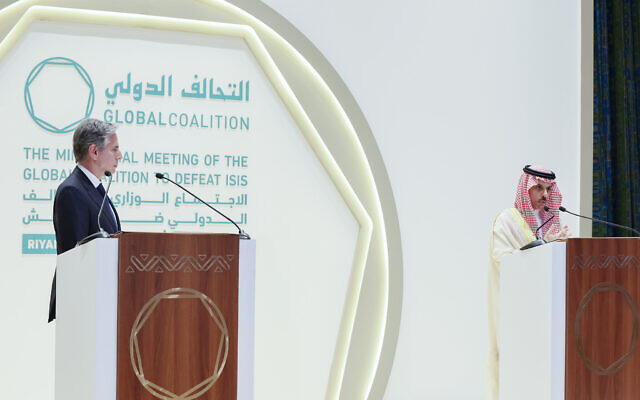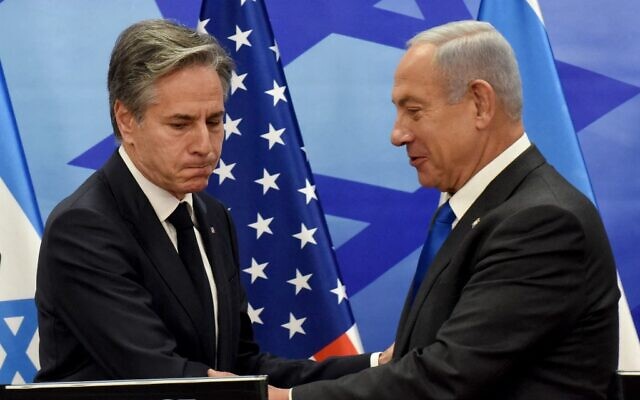Saudi FM: Normalization with Israel would have benefits, but less without two states
Asked about Riyadh’s widely reported demand that US back its civilian nuclear program, bin Farhan says kingdom prefers support from US but notes there are other potential ‘bidders’
Jacob Magid is The Times of Israel's US bureau chief

Saudi Foreign Minister Faisal bin Farhan said Thursday that Riyadh normalizing ties with Israel would bring significant benefits to the region but that those benefits would be limited by the absence of a two-state solution to the Israeli-Palestinian conflict.
“We believe that normalization is in the interest of the region, that it would bring significant benefits to all,” bin Farhan said in response to a question during a press conference in Riyadh with US Secretary of State Antony Blinken, following a meeting of the global coalition fighting the Islamic State group.
“But without finding a pathway to peace for the Palestinian people, without addressing that challenge, any normalization will have limited benefits,” he said, without mentioning Israel by name. “Therefore, I think we should continue to focus on finding a pathway toward a two-state solution, on finding a pathway toward giving the Palestinians dignity and justice. I think the US has a similar view that it’s important to continue on those efforts.”
The response was largely standard for Saudi officials who have long said publicly that they won’t normalize relations with Israel before the establishment of a Palestinian state on the pre-1967 lines, even though they’ve offered more flexibility behind closed doors. However, bin Farhan’s acknowledgment that normalizing ties with Israel would offer “significant benefits” appeared to stand out from previous comments.
If taken at every word, the use of the phrase “pathway toward a two-state solution” indicated that Riyadh would suffice with Israel taking steps in that direction in order for the kingdom to normalize ties with Israel. To date, Saudi officials that a two-state solution would need to be reached before they would be willing to normalize relations with the Jewish state.
However, bin Farhan used the term in January well before the Biden administration intensified its effort to broker a normalization deal between the two countries.
The Saudi foreign minister was also asked Thursday about the widely reported condition that his kingdom has for normalizing ties with Israel: US support for the civilian nuclear program that it’s working to build.
“It’s no secret that we are developing our domestic civilian nuclear program, and we would very much prefer to be able to have the US as one of the bidders,” bin Farhan said.

“There are others that are bidding, and obviously we would like to build our program with the best technology in the world,” he added, appearing to acknowledge that the US has the most to offer in terms of expertise.
The Biden administration has intensified its effort to broker an Israel-Saudi normalization deal in recent months.
Saudi Arabia has been willing to entertain the idea but is seeking several large concessions from the US. In addition to cooperation on the civilian nuclear program, which would likely be a cause of apprehension for both the US and Israel, it also expects security and economic guarantees from the Biden administration, a senior US official and a senior Middle East diplomat told The Times of Israel.
In addition, Saudi Arabia will expect a significant concession to the Palestinians in order to solidify any normalization deal, the officials said.
For his part, Blinken reiterated at the press conference that the US “fully support[s] Israel’s integration in the Middle East” and is working to both strengthen existing peace agreements Israel has signed with its Arab neighbors in addition to seeking to broker new deals. “That includes Saudi Arabia. I think this would be a very important step forward, and it would certainly be a priority and is a priority for us.”
Blinken confirmed that he discussed the issue with Saudi Crown Prince Mohammed bin Salman in Jeddah on Tuesday but did not provide any further details. The secretary also raised the issue on Wednesday during a meeting of the Gulf Cooperation Council in Riyadh. “We will continue to work at it, to advance it in the days, weeks and months ahead.”
The secretary added that “human rights are always on the agenda” during his meetings with Saudi officials and that he had raised “specific cases,” but did not say whether any progress had been made on the release of detainees or the lifting of travel bans on prominent activists.

Netanyahu and Blinken discuss Israel-US ties, AI and Iran
Shortly after the press appearance, Blinken spoke on the phone with Prime Minister Benjamin Netanyahu.
The call was ostensibly scheduled by Blinken’s office in order for the secretary to update Netanyahu on his talks in the Gulf kingdom but the readout from the prime minister’s office makes no direct mention of the normalization issue.
The State Department said the two discussed “expanding and deepening Israel’s integration into the Middle East through normalization with countries in the region.”
Blinken also raised “the need to uphold the commitments made at regional meetings in Aqaba and Sharm El Sheikh to avoid measures that undermine the prospects for a two-state solution.”
The Palestinians have in recent weeks accused Israel of violating such commitments, which included a four-month freeze on holding meetings to advance new settlement homes and a six-month freeze on legalizing new outposts. While Israel argues that it technically hasn’t done either, it has green-lit construction in East Jerusalem and is slated to hold a hearing next week to advance particularly controversial construction in the so-called E1 bloc in the heart of the West Bank and has illegally also transferred a yeshiva in the northern West Bank in what will make way for the legalization of the Homesh outpost.
The Israeli readout stated that Netanyahu expressed his appreciation for the military and intelligence cooperation Israel has with the US “which is at an all-time high.”
He also thanked Blinken for the “candid discussions” that took place last week in Washington between Netanyahu’s aides and senior officials in the Biden administration about the Iran nuclear file and expanding the Abraham Accords.
Netanyahu proposed promoting joint Israeli-American cooperation in the field of artificial intelligence, which has been on the premier’s mind lately following discussions with ChatGPT founder Sam Altman and Twitter CEO Elon Musk.
The prime minister and Blinken talked extensively about Iran. Netanyahu reiterated his position that Iran will not stop advancing its nuclear program, even if it agrees to revive the nuclear deal with the US, his office says he told Blinken.
“Israel will not be bound by any deal with Iran and will do everything to defend itself.”









